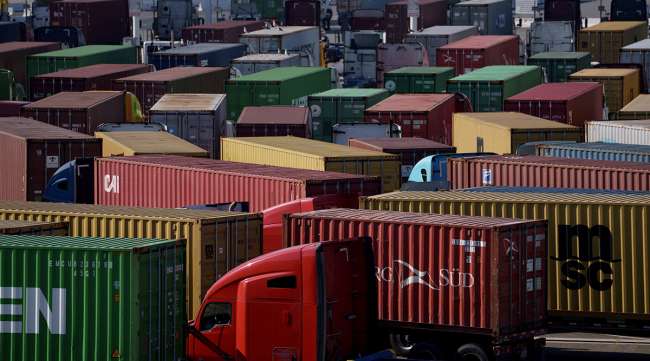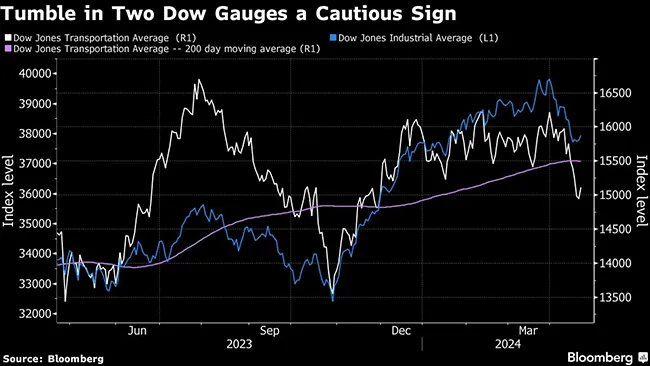Transportation Index Falls, Signaling Risks for Stock Market

[Stay on top of transportation news: Get TTNews in your inbox.]
Transportation companies that serve as a bellwether for the American economy sent up a smoke signal last week.
The Dow Jones Transportation Average tumbled to levels last seen in November and was on track to end lower for the third straight week. Moreover, the losses pushed the index deep below its 200-day moving average, a long-term trend indicator that traders closely watch. It is also on pace for the worst month since October.
The declines come despite encouraging results from United Airlines Holdings Inc., whose upbeat outlook suggested the consumer is staying strong. That puts the focus on trucking and logistics companies, two of which — J.B. Hunt Transport Services and Knight-Swift Transportation Holdings — warned of challenging conditions in the freight industry, including weak prices that were eroding margins.
As a result, two stock market gauges that together provide a clue about the state of the economy are now flashing early signs of caution, a situation that typically means more volatility lies ahead. A century-old market wisdom — the Dow Theory — requires that any move made by the Dow Jones Industrial Average needs to be confirmed by a similar move by the transport index and vice versa, for that direction to really hold.
TRUCKING STOCKS: How companies are faring right now
“Our concern is that it is frequently the case that Dow Transports’ weakness is a sign of broader economic weakness to come,” said Julian Emanuel, chief equity and quantitative strategist at Evercore ISI. While there are no such signs at present, the firm does forecast a mild recession to begin in the fourth quarter.

“Could Dow Transports be the leading edge of such a development? Absolutely,” the strategist added.
The decline in the transport index is a part of Evercore ISI’s thesis that the current correction in the S&P 500 will not end before testing its own 200-day moving average, that currently stands around 4,600. “If economic weakness becomes apparent, especially if inflation stays sticky, that correction could go deeper and last longer,” Emanuel added.
Nervousness about the broader markets intensified this week, as the dual blows from simmering geopolitical tensions and an increasingly hawkish Federal Reserve battered sentiment. The signs of a stubborn recession in the freight markets are fueling those concerns further.
J.B. Hunt fired the first warning shots during its quarterly results, saying demand was weak, sending shares of the whole group lower. Then Knight-Swift followed with lowered guidance for its first and second quarters, spreading the gloom deeper. J.B. Hunt and Knight-Swift rank No. 3 and No. 7, respectively, on the Transport Topics Top 100 list of the largest for-hire carriers in North America.
The Russell 3000 Trucking Index is poised for its worst weekly loss since June 2022, with the declines led by J.B. Hunt, Forward Air Corp., Saia Inc., ArcBest Corp., XPO Inc., Marten Transport Ltd., Heartland Express Inc. and Landstar System Inc.
“We’re now looking at a demand picture that suggests the bottom might still be ahead of us,” said Loop Capital Markets analyst Rick Paterson, who downgraded his recommendation on Knight-Swift this week.
Still, some say it may be too early to start worrying about the broader signals from this week’s slide in transportation stocks.
“The conventional wisdom used to be that stocks were stronger when both the Dow Industrial and Dow Transports were in uptrends. That has been the case over the very long term but not the case recently,” said Robert Anderson, U.S. sector strategist at Ned Davis Research. “So I wouldn’t be too worried from an overall market perspective.”
Also, results from railroad operator CSX Corp. were slightly above expectations, despite the tough freight market, suggesting some corners of the industry may continue to stay resilient.
“The freight economy was on fire due to the pandemic and we are now normalizing,” said Bloomberg Intelligence’s Lee Klaskow. “The non-service economy accounts for about 30% of the GDP, so you can have a freight recession and still have GDP growth.”
Want more news? Listen to today's daily briefing below or go here for more info:


